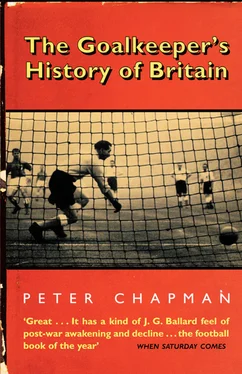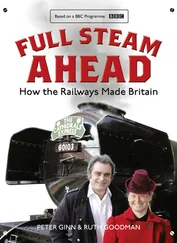I’d never realised he’d been away. With his solemn presence in the wings – his pronouncements on the ‘noble cause’ of the Korean War, and the like – he’d been awaiting his call, available when the country took stock of the seriousness of the situation. Enough people felt it was not the time for ‘tonics’ but for harder stuff to raise the spirit. A few more finest hours, that’s what was needed. Churchill came back with memories stirred of resolute wartime leadership and the glories of unflappable defence. Gil Merrick made his international debut three weeks later.
The selectors found the man they’d been looking for. They could have invented him. Merrick was from Birmingham City, the club of Harry Hibbs himself. Where Harry had been safe rather than spectacular, and Williams had modified the goalkeeping standard to spectacular but safe, so under Merrick it took a step back into history; he was referred to as ‘never unnecessarily spectacular’.
Merrick was in the image of Birmingham itself, capital of the English Midlands, the industrial heartland. It was just up the road from Coventry. Birmingham people didn’t say much, not that we’d have understood them when they did, but were quietly engaged in the job of rebuilding. They made hammers and drills, anchors and chains, gear boxes and other bits for cars, which was all pretty dull, really, but they ‘got on with it’. Gil Merrick played with the sleeves of his jersey neatly rolled to the elbow.
He was the model of post-war man. With a dark, neatly trimmed moustache, he looked like one of my scoutmasters and anyone’s gym teacher; apart from the rolled sleeves, it was his only hint of affectation. The programme my dad brought back from Wembley when he saw him in the Belgium game the following year said; ‘One of the few goalkeepers in the football league with a moustache.’ In the 1930s my mum used to write away to film stars in Hollywood and they’d send back autographs. To a generation brought up on Clark Gable, moustaches had an element of dash and made men ‘handsome’. Unfortunately, Hitler and, with his periodic returns to the country to save us, Sir Oswald Mosley had intervened and done nothing for them as far as I was concerned. But that wasn’t Gil Merrick’s fault.
Merrick was a PT expert and fitness fanatic. You could imagine him in white singlet and long trousers, crease finely pressed, standing calmly at ease as he awaited the order to vault the wooden horse or cartwheel across the rough coconut matting (if it chafed the skin, you just took no notice). When I later saw photos of him, his face was entirely placid. As far as 1 knew, he never smiled or looked as if he was about to. His hair, dark and receding at the temples, was brilliantined back and flat. As a goalkeeper, he was unflappable. He said it himself, he was ‘born to the defensive position’.
His debut was in his home city, at Villa Park, and a comfortable 2–0 win against Northern Ireland. It was an uncomplicated game in the manner of the home international championship, where football was played in the right way. Nippy wingers jinked down their right and left touchlines and inside-forwards were artful schemers. Respectively, they were marked by the full-backs – unsung, decent men with neatly greased and parted hair – and the half-backs who matched their opponents by being muscular and wily. In the vanguard of each attack was the centre-forward, a physical, thrusting player, much of whose game was reduced to single combat with a strong and unyielding centre-half. The goalkeeper stood detached and beyond, awaiting the outcome of the set-piece battles in front of him. This was how things were and were meant to be.
My dad, instinctively a Williams man, was a rapid convert. The Belgium game ended as a comfortable 5–0 win but the Belgians had put a few good shots in on goal. The day was November damp, the ball becoming heavier with each revolution across the Wembley surface and with each yard travelled through the afternoon murk. But every Belgian effort Merrick handled with absolute ease. He caught the ball ‘like he didn’t have a care, just picked it out of the air,’ my father said. ‘That wasn’t easy with those leather balls, they’d weigh pounds on a day like that.’ Actually, in the second half a white ball was used. It looked like the new plastic continental type that didn’t absorb water. Merrick later wrote that he didn’t like them because they swung around unpredictably, though this one proved to be the only one he came across that didn’t. Maybe it was a normal leather one which somebody had slapped a bit of white paint over.
In any event, Merrick’s handling was impeccable. Someone in the newspapers called him ‘the Clutch’ and the terraces picked up on it. From Bert Williams, ‘the Cat’, with its overtones of continental panache, England goalkeeping passed into the clutch of Merrick. It spoke again of the industrial Midlands, with its car factories and things. Very solid, reliable and British.
Just as well, because his first game in London, two weeks after his debut, brought home the nature of the outside threat. My father went again. In our role as founders of football, ‘everyone wanted to beat us’, he said. The latest to try were the Austrians, who came armed with the concept of ‘tactics’. These weren’t entirely new. Austria’s pre-war ‘Wunderteam’ had employed ‘tactics’ when they beat England 2–1 in Vienna. This was in 1936 shortly before Hitler had annexed Austria. The war had come and we’d largely forgotten about ‘tactics’, trusting the world might have the sense to do the same.
The Austrians were held in such high regard they were invited to play at Wembley. By contrast, France had never been afforded this full international honour, inferior footballers and poor ally in war that they were. Austria had flourished as a playing nation till overrun by the Nazis. Though on the wrong side in the war, this could largely be attributed in people’s minds to German belligerence. Austrians had about them underdog qualities. They might even rate as plucky. They still had the unwelcome occupying force of the Russians on their soil and it was touch and go in these grave times whether they’d leave. We instinctively liked the Austrians. They showed their gratitude by turning up at the headquarters of world football with a devious plan to overthrow us.
Against all natural law, they played with an attacking centre-half: Ernst Ocwirk, ernst in German meaning ‘serious’. He performed in a manner that made the conventions of the centre-half position a joke. He took the field with a number 5 on his back, as he should, but then showed this was a deliberate attempt to deceive. Instead of holding back to await the thrusts of the England centre-forward, he advanced to occupy something more like his own team’s central attacking position. Had he any decency, he’d have worn number 9 on his back. Then, just when the English team had noted where he was, he’d be gone, and back in his own team’s defence. Up and down the field in flowing fashion he and the Austrians played. The terraces, according to Fleet Street, nicknamed him ‘Clockwork’ Ocwirk. The Austrians ran into open spaces where they weren’t expected to run. They passed the ball to each other there and held it, while thinking next what to do. They kept it from the England players for lengthy periods of the game.
England couldn’t get a handle on them. The Austrians wouldn’t attack in conventional, civilised combat form. Nor would they stand up to be attacked. Characters you’d least expect would pop up and attack you. As suddenly they’d be gone. From the dark heart of the European continent, they were like those gorillas in the Malayan and Kenyan jungle. They, too, got together to concoct plans and tactics. They also probably sat in the dressing room swearing oaths. But everyone agreed they were damned tricky. (A few years later when one of my comics started giving away small photos of foreign players, Ocwirk’s was the first I collected.) With a minimum of effort they scored two goals. England did most of the running, often fruitlessly chasing the ball. But we had more muscle. Through physical endeavour, England scrambled a draw.
Читать дальше












